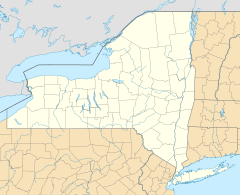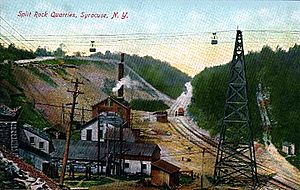Split Rock, New York facts for kids
Quick facts for kids
Split Rock
|
|
|---|---|
| Country | United States |
| State | New York |
| County | Onondaga |
| Time zone | UTC-5 (Eastern (EST)) |
| • Summer (DST) | UTC-4 (EDT) |
Split Rock is a small community called a hamlet in the Town of Onondaga. It is located in Onondaga County, New York, United States. Today, Split Rock is known more for its history than as a busy town. It is a special place for learning about old industrial sites.
A limestone quarry, which is a place where stone is dug from the ground, was started here by Gilbert Coons in 1834. Later, in 1880, the Solvay Process Company made the quarry much bigger. They used a long, raised conveyor belt to move limestone about two miles to their factory in Solvay. This limestone was important for a chemical process called the Solvay process. The quarry stopped working around 1912.
Contents
Split Rock's Role in World War I
The Munitions Factory
In 1915, during World War I, Split Rock became home to a factory that made war supplies. This factory was run by the Semet-Solvay Company. About 2,500 people worked there.
The 1918 Explosion
On July 2, 1918, a big explosion happened at the factory. It is believed that a mixing motor in the main building, where TNT was made, got too hot. TNT is a powerful explosive. The fire quickly spread through the factory, which was mostly made of wood. Firefighters had trouble because the water pressure dropped.
The factory eventually exploded. About 1 to 3 tons of TNT were involved in the blast. This explosion destroyed the building and resulted in the loss of at least 50 lives. Luckily, large amounts of TNT and picric acid (another explosive) stored in other buildings were not affected by the fire. The factory continued to make picric acid, nitric acid, and other products for the rest of the war.
After the War
After World War I ended, the factory stopped making war materials. For a while, the site was used by the State Department of Transportation. They used it for maintenance and parking until the mid-1980s.
Today, the area has mostly returned to nature. However, you can still find old ruins there. These include tunnels made by people and natural limestone caves.
Education in Split Rock
Split Rock High School was built in 1918. It served the community until 1950. At that time, it joined with other school districts to form the West Genesee Central School District. After that, Split Rock became an elementary school within the new district.
Natural History and Preservation
Split Rock is also famous for a special plant discovery. In 1807, a scientist named Frederick Pursh found the American hart's tongue fern here. This fern is now considered endangered in the United States.
To protect this rare fern and the historical remains of the quarry and factory, a special area was created. A 32-acre (13-hectare) part of Split Rock is now a New York State Unique Area. This means it is preserved for its unique natural and historical features. The state of New York and Onondaga County also own another 100 acres (40 ha) of land in the area.
 | Frances Mary Albrier |
 | Whitney Young |
 | Muhammad Ali |



